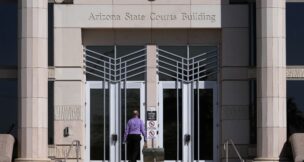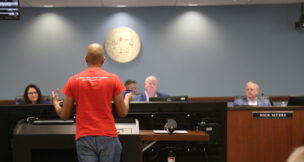Big Beautiful Bill risks deepening inequality while promising growth
Manasvi Jagtap, Guest Commentary//July 8, 2025//
Big Beautiful Bill risks deepening inequality while promising growth
Manasvi Jagtap, Guest Commentary//July 8, 2025//

The “One Big Beautiful Bill” (H.R. 1, 119th Congress) is being promoted as a pro-growth, pro-worker initiative. But for many Arizonans, especially working families, the bill’s sweeping changes could deepen inequality, undermine essential services, and destabilize the state’s long-term economic outlook.
At the heart of the bill is a permanent extension of the 2017 tax cuts, which primarily benefit corporations and high-income earners. In a state where the median household income is below the national average, at about $72,000, most Arizona families will see little impact. Although H.R. 1 proposes eliminating federal taxes on tips and overtime, this gesture does little for low-wage workers who already pay little or no federal income tax. Payroll taxes still apply, and wage theft, a common issue in low-income sectors, remains unaddressed.
The bill expands some itemized deductions, which disproportionately benefit wealthier households. Meanwhile, it fails to restore full refundability of the Child Tax Credit, a provision that once lifted thousands of Arizona children out of poverty. More than 900,000 children in the state benefited from the pandemic-era expansion of this credit, benefits that would disappear under H.R. 1.
In addition to tax policy, the bill makes major changes to social safety net programs like Medicaid and SNAP. It imposes stricter work-reporting requirements that could jeopardize health and food assistance for many Arizonans, especially those in seasonal or unstable jobs. Nearly 2 million state residents depend on Medicaid. Under these new requirements, a missed deadline could result in a loss of coverage. Similarly, increased SNAP documentation rules would disproportionately harm rural areas, where access to stable employment and affordable food is limited.
The bill’s environmental rollbacks pose further risks. H.R. 1 eliminates federal incentives for renewable energy and energy-efficient housing, while increasing subsidies for fossil fuels. This change threatens Arizona’s growing clean energy sector, including over 8,000 solar jobs, and worsens public health outcomes. Phoenix already ranks among the most polluted cities in the country. Without environmental protections, vulnerable communities face heightened exposure to air pollution, extreme heat and water scarcity.
H.R. 1 also allocates nearly $150 billion toward expanding border enforcement and detention. In Arizona, where over 13% of the population is foreign-born, these provisions could increase fear and instability within mixed-status households. The ripple effects of family separation and deportation would be felt across neighborhoods, schools and local economies that rely on immigrant labor.
Financially, the bill raises serious alarms. According to the Congressional Budget Office, H.R. 1 would add between $2.4 and $2.8 trillion to the national debt over the next decade. As interest payments grow, discretionary spending on critical services like education and infrastructure could be cut. Arizona already ranks near the bottom nationally in per-pupil education funding. Further austerity would only widen those gaps.
Taken together, H.R. 1 represents far more than a simple tax or spending package; it is a broad rewrite of America’s social contract. By prioritizing tax relief for corporations and the wealthy, slashing social supports, rolling back environmental protections, and halting emerging technology oversight, the bill risks entrenching inequality and leaving working people to shoulder its consequences.
Supporters of the bill may believe they are voting for opportunity and security, but in truth, H.R. 1 could erode the very foundations of economic stability. Jobs may vanish to unregulated automation; food and health support may be lost to rigid work rules; and clean air and water may become luxuries instead of rights. Even the promised tax relief will largely bypass households earning under $90,000, while rising debt threatens the programs millions depend on.
History shows that great nations do not thrive by hollowing out their social support. H.R. 1, and the political forces behind it, risk becoming a turning point where short-term promises eclipse long-term stability. Arizona residents should look closely at what is being proposed and who truly stands to benefit.
Manasvi Jagtap is a Junior at Arizona State University studying Finance and Business Law.














































